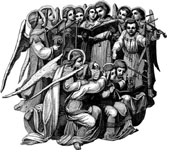
Heaven Help Us With the Homily
BOBBING HEADS
It’s Sunday morning in America and many Catholics at Mass seem about to doze off — it’s homily time, the weekly opportunity for the pastor to demonstrate how to miss the point, make the wrong point, or not make any point at all. Inept homilies turn off Catholics in droves: Ninety percent do not recall much of the preaching by the time they leave the church, according to one expert. But who needs an expert to remind us of the homiletic sedative pushed at us week after week?
Nothing on earth, it seems, leads our pastors to better homilies — not the years of seminary training, not the special books on the subject, not the database of homilies available to copy, not even the unmistakable signal from an audience of bobbing heads.
Despite broad-scale mediocrity, not all homilies fall short. An effective homily contributes more to parish success than any other factor. You find this out when you get a new pastor. By comparing numbers in Mass attendance, parishioner involvement in other activities, and financial contributions before and after a change in pastors (and thus a change in the homily), the reason for parish success, or lack of it, becomes apparent. We first noticed this in a church we attended years ago. Located in a thriving and expanding area, the large Mass attendance and parishioner involvement in other activities, plus a huge weekly collection, indicated a successful parish, and pastor. Then the pastor died suddenly; his replacement was quite different.
The new pastor’s homilies, although smooth and well paced, never influenced the lives of parishioners, or touched their heart, like the homilies of the former pastor. Within weeks, parishioners began trickling away. Within months it was obvious that contributions would not climb as they had every year under the old pastor; under the new pastor, contributions began to decline. To make up the deficit, the parish council introduced fundraising events and promotions, a sure sign of a weakening condition.
You May Also Enjoy
Now in our time an edition of the BCP has appeared under the auspices of the Roman Catholic Church, which does what none of its predecessors did or could do.
What options does a parish that currently offers celebrations of the Mass in the extraordinary form have if it finds itself unable to continue doing so?
There is a legend that a thousand years after the birth of Christ, Prince Vladimir…

